Key takeaways:
- Fraud scams exploit emotions and create a false sense of urgency, leading individuals to make hasty decisions.
- Common types of fraud include phishing scams, tech support scams, and online shopping scams; recognizing these patterns is crucial.
- Staying informed about scams through newsletters and community workshops enhances awareness and prevention efforts.
- Technological tools like two-factor authentication and VPNs can significantly bolster personal security against scams.
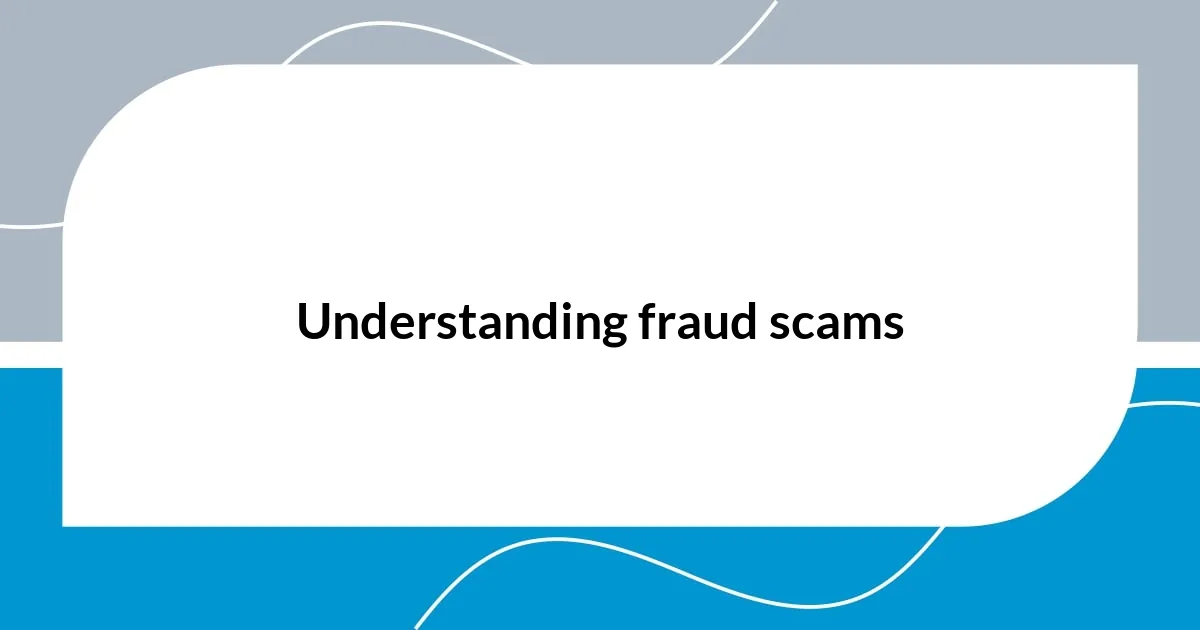
Understanding fraud scams
Fraud scams often work by exploiting our emotions and trust, leading us to make hasty decisions. I remember when I received an email claiming I’d won a significant sweepstakes. My heart raced with excitement, but thankfully, I took a moment to think. Was it really possible that I had won something without entering? That pause saved me from a common pitfall.
Understanding the psychology behind these scams can help us stay one step ahead. Scammers usually create a false sense of urgency, making us believe we need to act immediately. It’s frustrating, isn’t it, how they can make us doubt our instincts? Just think about it—if something seems too good to be true, it probably is.
Another aspect to consider is the variety of tactics scammers use. From phishing emails to fake tech support calls, their approaches are as creative as they are deceptive. I still feel that rush of anxiety when I recall how I almost fell for a “tech support” scam that claimed my computer was infected. I mean, how often do we find ourselves frantic over technology? Understanding what these tactics look like can empower us to spot them before they catch us off guard.
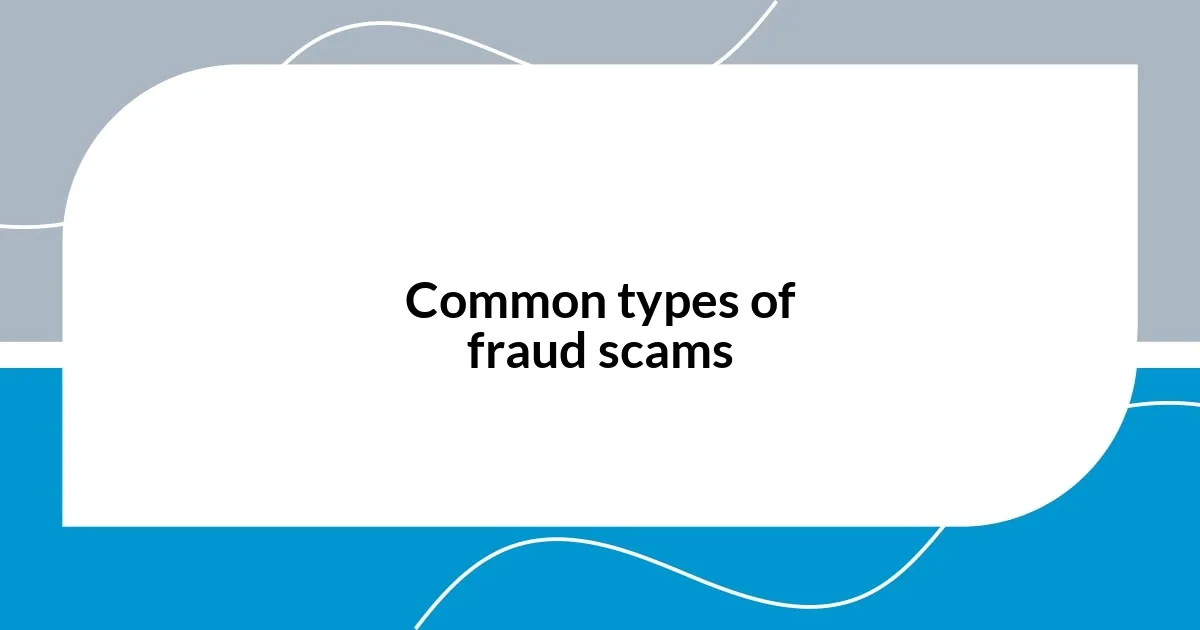
Common types of fraud scams
Fraud scams come in various forms, each more clever than the last. One that comes to mind is the classic lottery scam. I once had a friend who received a call telling her she’d won a huge jackpot. She was ecstatic but when they asked for her bank information to deposit the “winnings,” she realized something was definitely off. It’s bewildering how quickly excitement can cloud our judgment.
Here are some common types of fraud scams to look out for:
- Phishing scams: Deceptive emails or messages that appear to be from legitimate sources, prompting you to share personal information.
- Tech support scams: Fraudulent calls claiming that your computer is compromised and offering fake solutions for a fee.
- Investment scams: Schemes promising high returns with little risk, often enticing people with urgency and exclusivity.
- Romance scams: Scammers create fake profiles on dating sites to establish emotional connections and then ask for money.
- Online shopping scams: Fake websites that mimic legitimate retailers but steal your payment information instead.
Recognizing these patterns is crucial, as I’ve learned from firsthand experiences and stories shared by others. It’s those unsettling moments of realization that keep me cautious and aware in our increasingly digitized world.
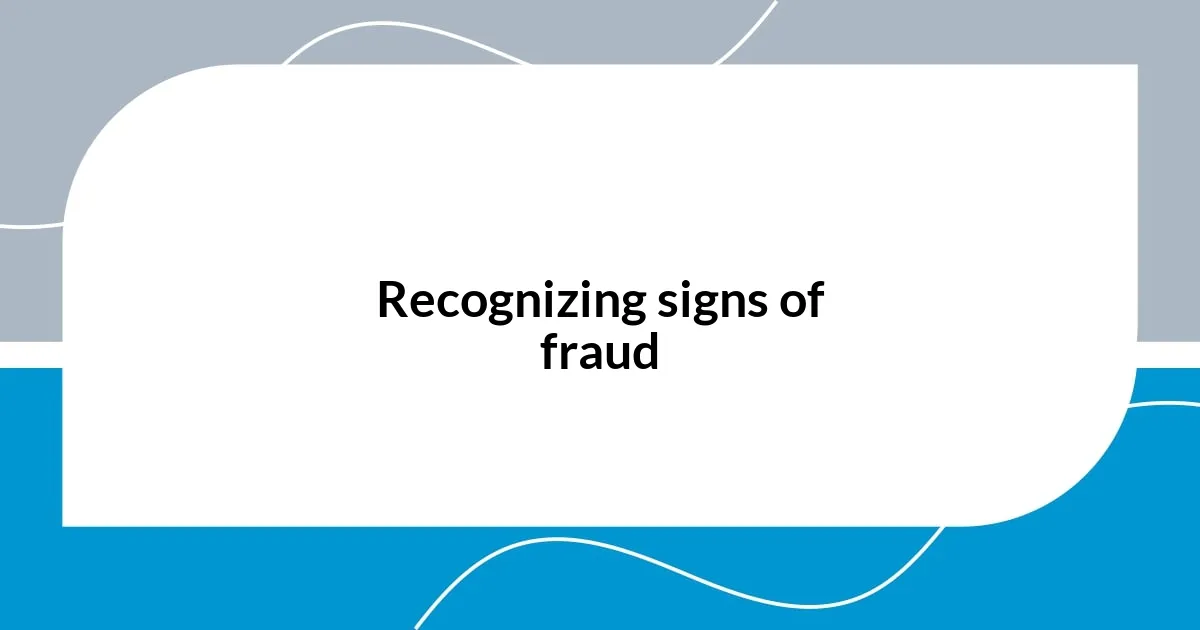
Recognizing signs of fraud
It’s essential to be vigilant when it comes to recognizing signs of fraud. One major red flag is unsolicited communication. If you receive unexpected emails or messages asking for sensitive information, it should raise an alarm. I recall a time when a stranger messaged me on social media, claiming to be a financial advisor offering a limited-time investment opportunity. My gut told me to investigate further, which led me to uncover that this was a common scam targeting unsuspecting users. Trust me, listening to your instincts can be a game-changer.
Another sign to look out for is the pressure to act quickly. Scammers often rush you, making you feel like you’ll miss out if you don’t respond immediately. Last year, I was approached by a “charity” urging donations for disaster relief. Their aggressive tactics made me take a step back—why should I feel panicked about helping? Taking a moment to verify the organization revealed it wasn’t recognized. That one pause saved me from not only potential financial loss but also emotionally taxing regret.
Lastly, be on the lookout for inconsistencies in communication. If the language seems off—poor grammar, strange syntax, or inconsistent claims—those are huge warning signs. I once got a call from someone claiming to be from my bank, but something about their dialogue felt scripted and disingenuous. When I checked directly with my bank, it turned out to be a scam attempt. Our inner skepticism can be a powerful ally in recognizing deceit.
| Sign of Fraud | Description |
|---|---|
| Unsolicited Communication | Unexpected messages asking for personal information |
| Pressure to Act Quickly | Urgency in requests or offers to provoke hasty decisions |
| Inconsistent Communication | Unusual language or grammar that feels off or scripted |
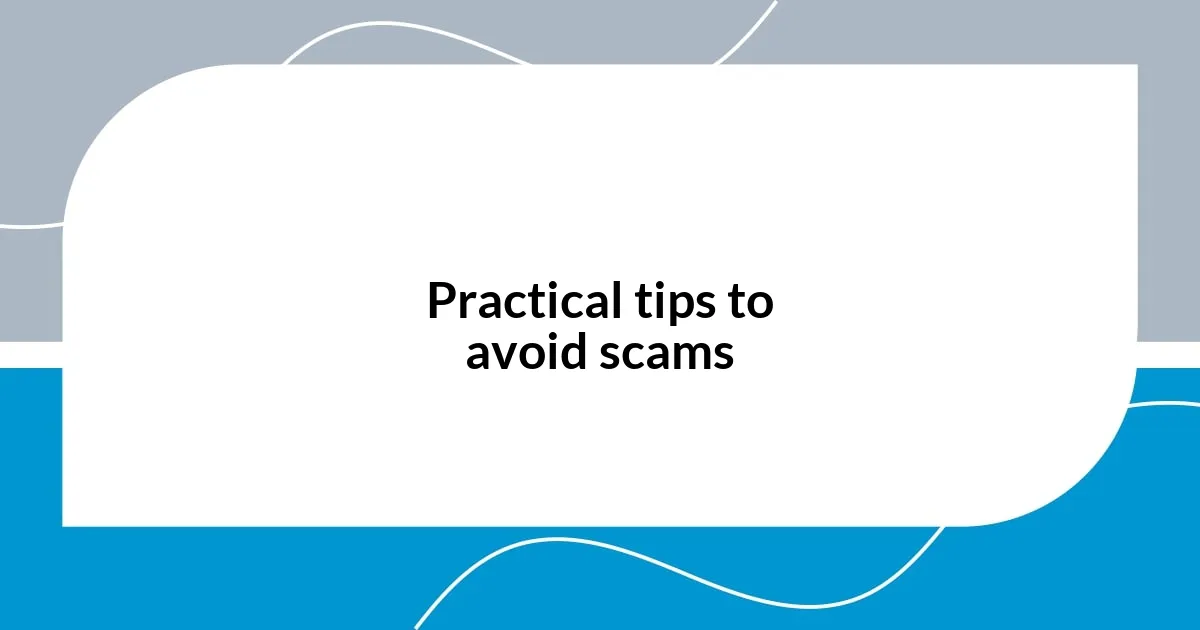
Practical tips to avoid scams
Sometimes, we overlook simple actions that can help protect us from scams. One of the most effective tips I’ve found is to regularly update passwords across accounts. Just a few months ago, I updated my bank password using a combination of letters, numbers, and symbols. It felt a bit tedious, but knowing that I’m adding a layer of security gives me peace of mind. Have you ever considered how often you really change your passwords?
Another practical strategy is to research before engaging with unfamiliar offers. When I stumbled upon a seemingly fantastic investment opportunity online, I didn’t rush in. Instead, I took the time to look it up, and to my surprise, several warning articles flagged it as a scam. This was a huge lesson in the importance of due diligence, and it made me wonder—how many people miss out on red flags simply due to excitement?
Lastly, I believe maintaining a healthy skepticism, especially with unsolicited communications, is crucial. For instance, I once received an email promising a once-in-a-lifetime vacation deal that seemed too good to be true. Thankfully, I paused to examine it closely instead of clicking on the link right away. My instinct saved me from what could have been a costly mistake. It’s critical to ask yourself, “Does this really sound legitimate?” Trusting your gut often leads to better decisions in protecting yourself from scams.
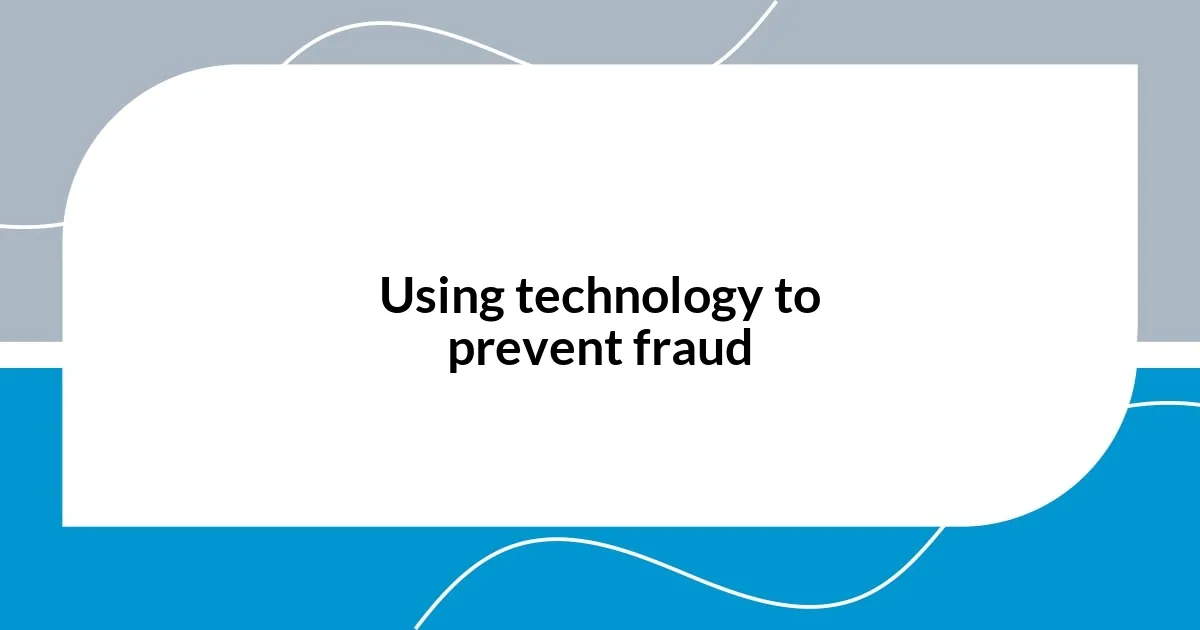
Using technology to prevent fraud
I’ve become a strong proponent of using technology to help prevent fraud, especially given how sophisticated scams can be these days. For instance, I rely on two-factor authentication (2FA) whenever possible. The extra step of verifying my identity through a code sent to my phone—or even better, a biometric scan—feels like a digital bouncer guarding the front door of my accounts. Have you tried it? It’s like having an additional safety net that gives you a little more control over your online presence.
Another tool that I’ve found invaluable is a virtual private network (VPN). When I travel or use public Wi-Fi, I always connect to a VPN to safeguard my online activity. This technology encrypts my internet connection, making it difficult for scammers to intercept my data. One time, while sitting in a café, I noticed a suspicious-looking network trying to lure people in. I felt a surge of relief knowing I was protected. Isn’t it comforting to think technology can bolster our defenses?
Additionally, I routinely monitor my credit report and financial accounts through apps that alert me to any suspicious activity. It’s almost become a ritual for me; I feel empowered by taking control of my finances. Just the other day, I received a notification about an unusual transaction. Thanks to technology, I could address it immediately. Have you ever had that rush of adrenaline when you spot something off? It’s crucial to leverage these invaluable tech tools to stay ahead of potential threats.
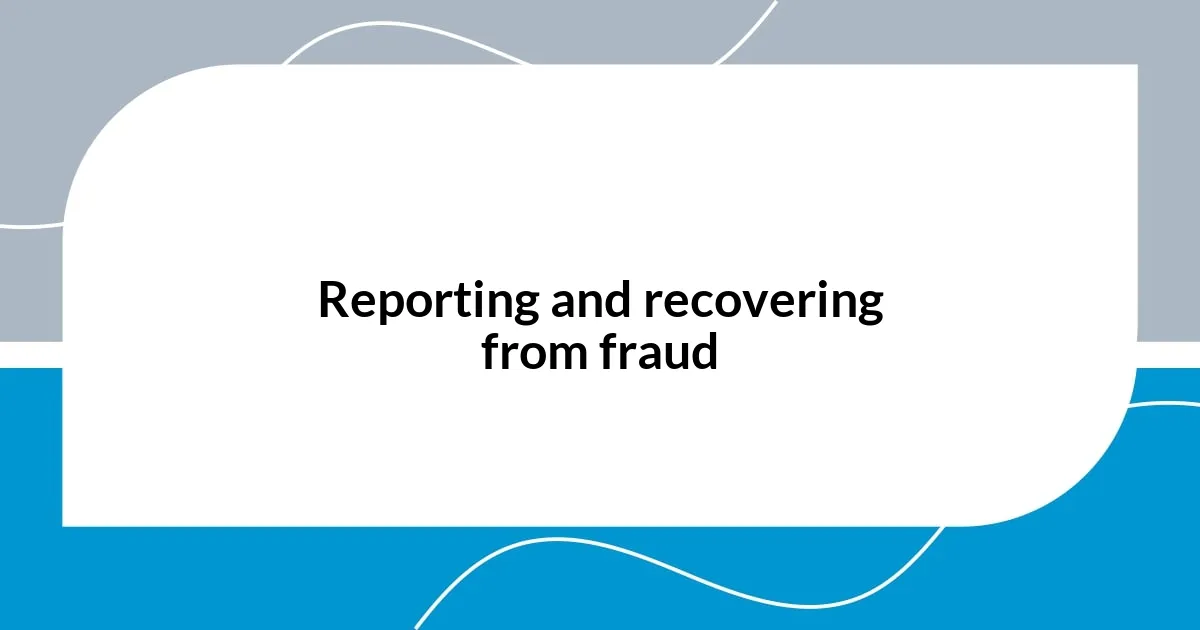
Reporting and recovering from fraud
Reporting fraud can feel overwhelming, but prompt action is vital. I remember once spotting an unauthorized charge on my credit card—my heart raced as I dialed the bank’s fraud hotline. Within minutes, I had reported the fraud, and they assured me they’d investigate and issue a refund. It made me realize how crucial it is to keep those contact numbers handy; do you have your bank’s fraud department saved?
Once you report fraud, the recovery process can be a journey. I was pleasantly surprised at how efficient my bank was in resolving the issue. They guided me step-by-step through disputing the charge. It felt reassuring to know I wasn’t navigating this alone; getting support during a tough time can make all the difference. Have you ever needed support during a similar experience?
Additionally, documenting every interaction during the recovery process is essential. I learned this the hard way when I failed to take notes during one of my calls. I ended up confused about which information had been provided, leading to unnecessary delays. Now, I keep a running log of dates, times, and details. It’s empowering to have everything in one place. How do you keep track of important interactions?
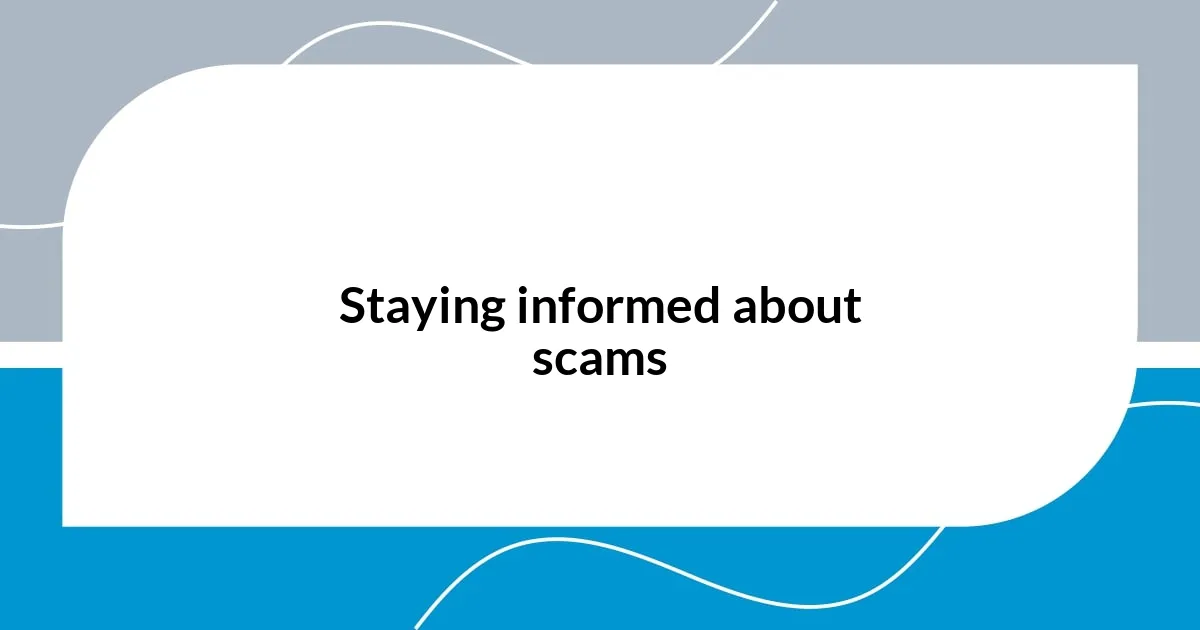
Staying informed about scams
Staying informed about scams is crucial in today’s digital landscape. One way I keep myself updated is by subscribing to newsletters that focus on consumer protection and fraud alerts. Recently, I received a warning about a new phishing scam where scammers impersonate official organizations. That warning was an eye-opener; it reminded me of the importance of knowledge as a line of defense. How do you stay in the loop?
I also make it a habit to follow reputable social media accounts that share insights on current scams. A few months back, I came across a post outlining common signs of telemarketing fraud. I immediately spotted a foot-in-the-door scam that an acquaintance fell for, and it sparked a conversation between us. Have you ever shared a piece of information that helped someone avoid a tricky situation? It’s such a rewarding feeling.
Lastly, I attend community workshops or webinars on fraud prevention whenever I can. During one event, an expert shared practical tips on how to recognize red flags in emails or messages. It just clicked for me; I realized I wasn’t just a passive consumer of information anymore but an active participant in safeguarding myself and others. Doesn’t it feel good to be part of a community focused on empowerment and awareness?